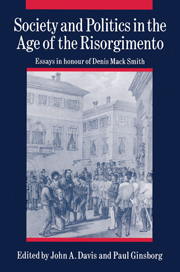Book contents
- Frontmatter
- Contents
- List of figures and maps
- List of contributors
- Preface
- Map 1 Italy in 1815
- Map 2 Italy in 1870
- Map 3 Italy – place names
- 1 1799: the Santafede and the crisis of the ancien régime in southern Italy
- 2 War and society in Napoleonic Italy: the armies of the Kingdom of Italy at home and abroad
- 3 The poor and how to relieve them: the Restoration debate on poverty in Italy and Europe
- 4 Bandits, violence and the organization of power in Sicily in the early nineteenth century
- 5 Marriage and the family in Italy in the early nineteenth century
- 6 After the Revolution: bandits on the plains of the Po 1848–54
- 7 Labouring women in northern and central Italy in the nineteenth century
- 8 Garibaldi in England: the politics of Italian enthusiasm
- 9 The middle classes in Liberal Italy
- 10 Francesco De Sanctis: the politics of a literary critic
- Bibliography of Denis Mack Smith's writings on nineteenth-century Italy
- Index
2 - War and society in Napoleonic Italy: the armies of the Kingdom of Italy at home and abroad
Published online by Cambridge University Press: 30 January 2010
- Frontmatter
- Contents
- List of figures and maps
- List of contributors
- Preface
- Map 1 Italy in 1815
- Map 2 Italy in 1870
- Map 3 Italy – place names
- 1 1799: the Santafede and the crisis of the ancien régime in southern Italy
- 2 War and society in Napoleonic Italy: the armies of the Kingdom of Italy at home and abroad
- 3 The poor and how to relieve them: the Restoration debate on poverty in Italy and Europe
- 4 Bandits, violence and the organization of power in Sicily in the early nineteenth century
- 5 Marriage and the family in Italy in the early nineteenth century
- 6 After the Revolution: bandits on the plains of the Po 1848–54
- 7 Labouring women in northern and central Italy in the nineteenth century
- 8 Garibaldi in England: the politics of Italian enthusiasm
- 9 The middle classes in Liberal Italy
- 10 Francesco De Sanctis: the politics of a literary critic
- Bibliography of Denis Mack Smith's writings on nineteenth-century Italy
- Index
Summary
In January 1802 Napoleon renamed the former Cisalpine Republic the Italian Republic, and in March 1805 this in turn became the Kingdom of Italy, with Napoleon himself as king and Eugene Beauharnais as viceroy.Covering an area of some 84,000 square kilometres, the Kingdom stretched from Novara to the River Tronto, and contained nearly seven million inhabitants or nearly a third of the total population of Italy at the time. The Italian Republic inherited the chaotic military forces of its predecessor, the Cisalpine Republic, and found itself in 1802 with a National Guard that hardly existed and about 1,400 troops of the line, most of whom were foreigners, at least half being Poles. In his Oration to Bonaparte the soldier-poet Ugo Foscolo described the Republic's army as ‘a militia in mere embryo’ and more mercenary than national in character. This greatly concerned Pietro Teulie, one of the Republic's ablest generals and for some months the Minister of War. Teulie believed that the creation of a genuinely ‘national’ army was the only means of escaping overpowering French domination, and for that reason he favoured compulsory conscription – and was supported by Francesco Melzi d'Eril, the vice-president of the new Republic.
By the law of 13 August 1802 all males in the ‘nation’ between the ages of twenty and twenty-five were obliged to enlist in the army; exemptions were made only for those who had contracted to marry before the law was published, for widowers with dependent children, ministers of religion, and seminarists. Substitutes were allowed, but had to be presented within three days of the call to arms, be physically fit, and be under thirty years of age.
- Type
- Chapter
- Information
- Society and Politics in the Age of the RisorgimentoEssays in Honour of Denis Mack Smith, pp. 26 - 48Publisher: Cambridge University PressPrint publication year: 1991



